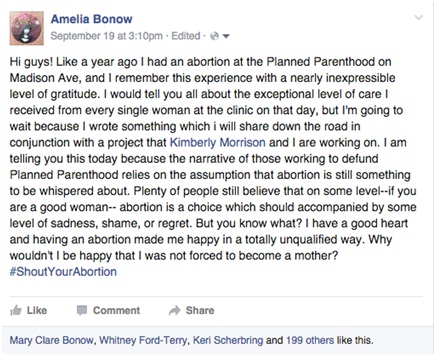#ShoutYourAbortion: a positive step towards the de-stigmatisation of abortion

Amelia Bonow’s Facebook post has become international news.
The #ShoutYourAbortion hashtag running rampant around social media for the past few days is yet another wonderful initiative to be applauded in our world of ever-growing social consciousness. What began merely as a lovely, honest and unassuming Facebook post by Amelia Bonow became international news as many who understood its cultural and political significance took Bonow’s story of abortion to heart.
The explosion of the hashtag has perpetuated a consequence of an unpredicted effect: a step towards the de-stigmatisation of abortion, and the promotion of improved reproductive health for women. The sharing of personal anecdotes about abortion means the uncovering of not only the different but also positive experiences that women have gained in choosing abortion. As Bonow had aptly summed up, there is nothing complicated or controversial about the idea that women can actually be happy and grateful that they had the choice to not become a mother they never wanted to be.
#ShoutYourAbortion promotes the idea that abortion should no longer be a concept we tiptoe around. It should no longer be a taboo word that casts a dark pall over otherwise lighthearted and pleasant conversations about gender wage gaps, rape culture, and other social constructs limiting the choices and individual autonomy of women. Rather than dousing ourselves in holy water at the first mention of the word, we should embrace such stories with sensitivity and an open mind as to why women choose to get abortions and how many of them can actually feel happier because of that decision. Society should be mindful that some women who have chosen abortions have undergone a deeply profound and personal life-changing experience; one that should never be coldly evaluated by strangers who vindictively seek to instil regret and shame into these women.
It may please some (all, is what I mean) of us to know that Bonow has long been considering putting together a zine about abortion stories or even launching a YouTube channel to raise awareness of the issue and aid in its de-stigmatisation. Indeed, the creation of such a welcoming and open forum would do well in removing the stain that abortion still has on social psyche as a negative and unwanted experience. Additionally, Bonow is very much cognisant of the potential for her project to turn into a ‘white girl feminist conversation’, and she reassures us that she would aim to ensure her activism encompasses ‘women of colour and poor women, who are the most deeply disenfranchised by anti-reproductive rights legislation’. This careful consideration on Bonow’s part will hopefully allow for the movement to be as intersectional as possible.
However, the concept of openly exchanging stories to remove negative connotations is not an unfamiliar one. As writer and executive director of editorial at Feministing, Maya Dusenbery noted last year in an article about representations of abortion in pop culture:
The idea that telling abortion stories can help combat stigma – and in turn transform cultural attitudes about the issue – is nothing new. A belief in the potential power of “coming out” about our abortion experience dates back at least to the abortion speak-outs of the pre-Roe era and, in the last decade, has been resurrected in “I had an abortion” t-shirts and hash tags, as well as political spaces for people who’ve had abortions to connect.
Nonetheless, Bonow has also suffered from the vicious backlash hurled her way in the form of spiteful threats, tweets and conservative response pieces concocted in the putrid anti-choice cauldron. Additionally, Bonow’s home address was posted on the right-wing site ‘Daily Caller’. This is obviously very worrisome for Bonow, who has felt unsafe in her own apartment in the fear that extremists would show up on her doorstep to silence her.
Furthermore, the recent Bill pushed forth by the U.S. Congress to defund Planned Parenthood is a clear and unfortunate testament to the anti-abortion, anti-choice movement. Planned Parenthood is the largest reproductive health care provider in the U.S., providing women across the nation with support and medical treatment to improve their reproductive health. Perhaps, more importantly, the organisation protects women’s fundamental human right to freedom of reproductive choice. Rather than defunding such an organisation so indisputably integral to enabling women access to reproductive health care, online feminist blog Bitch Media covers a whole bunch of other programs that should lose federal funding instead.
In the face of all this unrelenting opposition, however, Bonow’s hashtag is something akin to a call to arms for women across the globe. Indeed, she proudly says, ‘Women around the world have used this hashtag to take back some space in digital culture that should have been ours all along… women using their voices in this way is fucking terrifying to these people. They’ve relied on our silence to control the narrative.’ Bonow is not going to stop shouting about her abortion, and I sure as hell am looking forward to hearing the cacophony of voices joining her.


Pingback: Planned Parenthood: Beyond Abortion | Lip Magazine